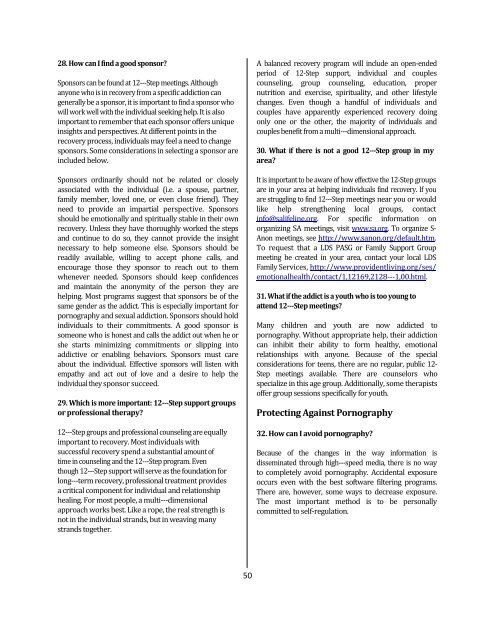Safety Net
Safety Net
Safety Net
Create successful ePaper yourself
Turn your PDF publications into a flip-book with our unique Google optimized e-Paper software.
28. How can I find a good sponsor?<br />
Sponsors can be found at 12-Step meetings. Although<br />
anyone who is in recovery from a specific addiction can<br />
generally be a sponsor, it is important to find a sponsor who<br />
will work well with the individual seeking help. It is also<br />
important to remember that each sponsor offers unique<br />
insights and perspectives. At different points in the<br />
recovery process, individuals may feel a need to change<br />
sponsors. Some considerations in selecting a sponsor are<br />
included below.<br />
Sponsors ordinarily should not be related or closely<br />
associated with the individual (i.e. a spouse, partner,<br />
family member, loved one, or even close friend). They<br />
need to provide an impartial perspective. Sponsors<br />
should be emotionally and spiritually stable in their own<br />
recovery. Unless they have thoroughly worked the steps<br />
and continue to do so, they cannot provide the insight<br />
necessary to help someone else. Sponsors should be<br />
readily available, willing to accept phone calls, and<br />
encourage those they sponsor to reach out to them<br />
whenever needed. Sponsors should keep confidences<br />
and maintain the anonymity of the person they are<br />
helping. Most programs suggest that sponsors be of the<br />
same gender as the addict. This is especially important for<br />
pornography and sexual addiction. Sponsors should hold<br />
individuals to their commitments. A good sponsor is<br />
someone who is honest and calls the addict out when he or<br />
she starts minimizing commitments or slipping into<br />
addictive or enabling behaviors. Sponsors must care<br />
about the individual. Effective sponsors will listen with<br />
empathy and act out of love and a desire to help the<br />
individual they sponsor succeed.<br />
29. Which is more important: 12-Step support groups<br />
or professional therapy?<br />
12-Step groups and professional counseling are equally<br />
important to recovery. Most individuals with<br />
successful recovery spend a substantial amount of<br />
time in counseling and the 12-Step program. Even<br />
though 12-Step support will serve as the foundation for<br />
long-term recovery, professional treatment provides<br />
a critical component for individual and relationship<br />
healing. For most people, a multi-dimensional<br />
approach works best. Like a rope, the real strength is<br />
not in the individual strands, but in weaving many<br />
strands together.<br />
50<br />
A balanced recovery program will include an open-ended<br />
period of 12Step support, individual and couples<br />
counseling, group counseling, education, proper<br />
nutrition and exercise, spirituality, and other lifestyle<br />
changes. Even though a handful of individuals and<br />
couples have apparently experienced recovery doing<br />
only one or the other, the majority of individuals and<br />
couples benefit from a multi-dimensional approach.<br />
30. What if there is not a good 12-Step group in my<br />
area?<br />
It is important to be aware of how effective the 12-Step groups<br />
are in your area at helping individuals find recovery. If you<br />
are struggling to find 12-Step meetings near you or would<br />
like help strengthening local groups, contact<br />
info@salifeline.org. For specific information on<br />
organizing SA meetings, visit www.sa.org. To organize S-<br />
Anon meetings, see http://www.sanon.org/default.htm.<br />
To request that a LDS PASG or Family Support Group<br />
meeting be created in your area, contact your local LDS<br />
Family Services, http://www.providentliving.org/ses/<br />
emotionalhealth/contact/1,12169,2128-1,00.html.<br />
31. What if the addict is a youth who is too young to<br />
attend 12-Step meetings?<br />
Many children and youth are now addicted to<br />
pornography. Without appropriate help, their addiction<br />
can inhibit their ability to form healthy, emotional<br />
relationships with anyone. Because of the special<br />
considerations for teens, there are no regular, public 12-<br />
Step meetings available. There are counselors who<br />
specialize in this age group. Additionally, some therapists<br />
offer group sessions specifically for youth.<br />
Protecting Against Pornography<br />
32. How can I avoid pornography?<br />
Because of the changes in the way information is<br />
disseminated through high-speed media, there is no way<br />
to completely avoid pornography. Accidental exposure<br />
occurs even with the best software filtering programs.<br />
There are, however, some ways to decrease exposure.<br />
The most important method is to be personally<br />
committed to self-regulation.


